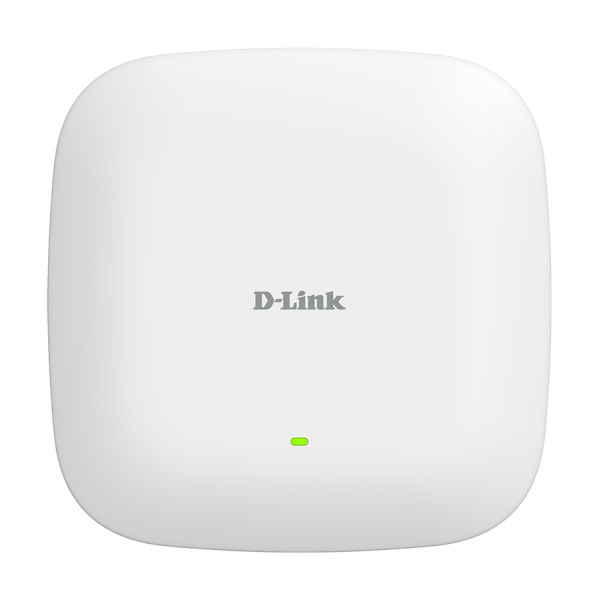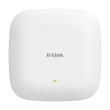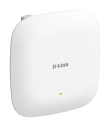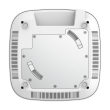
DAP-X2850חדש
Wi-Fi 6 AX3600 Dual Band MU-MIMO PoE Access Point
תאור
The DAP-X2850 Wi-Fi 6 AX3600 Dual Band MU-MIMO PoE Access Point is designed for small to medium businesses or enterprises, providing unparalleled bandwidth and flexibility for for administrators looking to deploy a medium to large scale Wi-Fi network. This AP has manageable dual-band wireless LAN options and utilizes the cutting-edge speed of Wireless AX and. Not only can the AP operate in standalone mode, it can also be centrally managed by D-Link Nuclias Connect. Highly manageable and capable of blazing speeds, the Unified AX Wireless Access Point integrates seamlessly into any existing network infrastructure and can be easily scaled to meet future demands.
Wi-Fi 6
The DAP-X2850 delivers reliable, high-speed wireless performance using the latest 802.11ax standard with maximum wireless signal rates of up to 1147 Mbps over the 2.4 GHz band, and 2402 Mbps over the 5 GHz band. The DAP-X2850 supports 802.11ax1 technology (also known as Wi-Fi 6). OFDMA (Orthogonal Frequency Division Multiple Access) and uplink/downlink MU-MIMO (multi-user - multiple input multiple output) boost channel capacity and efficiency, enabling more clients to access the network.
Versatile Access Point Functionality
The DAP-X2850 allows network administrators to deploy a highly manageable and extremely robust simultaneous dual-band wireless network. The DAP-X2850 can provide optimal wireless coverage over either the 2.4 GHz (802.11b, 802.11g, 802.11n and 802.11ax) or the 5 GHz (802.11a, 802.11n, 802.11ac and 802.11ax) bands. The DAP-X2850 can be ceiling mounted, wall mounted, or placed on a desktop to meet any wireless demands. For advanced installations, the DAP-X2850 has integrated 802.3at Power over Ethernet (PoE) support, allowing the device to be installed in areas where power outlets are not readily available.
Security
To help maintain a secure wireless network, the DAP-X2850 supports both Personal and Enterprise versions of WPA, WPA2 (802.11i) and WPA3, with support for RADIUS server backend and a built-in internal RADIUS server allowing users to create their accounts within the device itself. This access point also includes MAC address filtering, wireless LAN segmentation, SSID broadcast disable, rogue AP detection, and wireless broadcast scheduling for further protection of your wireless network. The DAP-X2850 includes support for up to eight VLANs per band, allowing multiple SSIDs to be implemented and further segment users on the network. It also includes a wireless client isolation mechanism, which limits direct client-to-client communication. Additionally, the DAP-X2850 supports Network Access Protection (NAP), allowing network administrators to define multiple levels of network access based on individual client's needs.
Multiple Operation Modes
DAP-X2850 supports several operating modes: Access Point, Wireless Distribution System (WDS), WDS with AP, Wireless Client. As a standard wireless access point (AP) the DAP-X2850 can connect to a wide range of devices that are 802.11n/g/b/ac/ax compliant. In wireless distribution system (WDS) mode it can expand current wireless coverage without the need for a wired backbone link. As a wireless client it can connect to an existing AP and and provide access to the network for devices connected using an Ethernet cable. The DAP-X2850 also features advanced features such as load balancing and redundancy, for fail-safe wireless connectivity.
Network Management
Network administrators have multiple options for managing the DAP-X2850, including web (HTTP), Secure Socket Layer (SSL, which provides for a secure connection to the Internet), Secure Shell (SSH, which provides for a secure channel between local and remote computers), and Telnet. In addition, the DAP-X2850 has a wireless scheduler feature, which turns off wireless functionality when it isn't needed, saving power. With simultaneous dual-band functionality, PoE support, extensive manageability, versatile operation modes, and solid security enhancements, the DAP-X2850 provides small to medium business and enterprise environments with a business-class solution for deploying a wireless network.
MU-MIMO Technology
The DAP-X2850 supports MU-MIMO (Multi-User Multiple Input Multiple Output), which enables the device to simultaneously communicate with multiple clients using multiple antennas. This allows the access point to utilize the spectrum more efficiently and significantly increase the network capacity.
מאפיינים כללים
|
Hardware
|
|||||||||||
|
Interfaces
|
• 802.11a/b/g/n/ac/ax (Wi-Fi 6)1
• 1x100/1000/2.5GBase-T LAN 802.3at PoE port
• 1x10/100/1000Base-T LAN port
• 1xRJ45 Concole port
|
||||||||||
|
LEDs
|
• Power/Status
- Solid green - Device operational
- Flashind red - Device booting up/Device malfunctioned
- Solid red - Device boot up has failed
|
||||||||||
|
Buttons
|
• Factory reset button
|
||||||||||
|
Antennas
|
• Four internal antennas with 3.5 dBi for 2.4 GHz
• Four internal antennas with 5.5 dBi for 5 GHz
|
||||||||||
|
MIMO
|
• 4x4, MU-MIMO
|
||||||||||
|
Power connector
|
• Power input connector (12V DC 2.5A)
|
||||||||||
|
Wireless Module Parameters
|
|||||||||||
|
Standards
|
• IEEE 802.11a/b/g/n/ac/ax1
|
||||||||||
|
Wireless Frequency Range
|
• 2.4 GHz: 2.4 GHz to 2.4835 GHz
• 5 GHz: 5.15 GHz to 5.825 GHz2
|
||||||||||
|
Wireless Security
|
• WPA-Personal/Enterprise
• WPA2-Personal/Enterprise
• WPA3-Personal/Enterprise
• 64/128-bit WEP encryption
• AES and TKIP
• SSID broadcast disable MAC address access control
• Network Access Protection (NAP)
• Internal RADIUS server
• Captive Portal Authentication
|
||||||||||
|
Wireless speed
|
• 802.11a: 6, 9, 12, 18, 24, 36, 48 and 54 Mbit/s
• 802.11b: 1, 2, 5.5 and 11 Mbit/s
• 802.11g: 6, 9, 12, 18, 24, 36, 48 and 54 Mbit/s
• 802.11n: 6.5 ~ 600 Mbit/s
• 802.11ac: 6.5 ~ 1733 Mbit/s
• 802.11ax: up to 2402 Mbit/s
|
||||||||||
|
Transmitter Output Power*
*The maximum value of the transmitter output power depends upon the radio frequency regulations applied in your country.
|
• IEEE 802.11a:
17.5 dBm at 6 Mbit/s
17.5 dBm at 9 Mbit/s
17.5 dBm at 12 Mbit/s
17 dBm at 18 Mbit/s
16 dBm at 24 Mbit/s
15.5 dBm at 36 Mbit/s
15 dBm at 48 Mbit/s
14 dBm at 54 Mbit/s
• IEEE 802.11b:
20 dBm at 1, 2, 5.5, 11 Mbit/s
• IEEE 802.11g:
20 dBm at 6 Mbit/s
20 dBm at 9 Mbit/s
20 dBm at 12 Mbit/s
20 dBm at 18 Mbit/s
18 dBm at 24 Mbit/s
18 dBm at 36 Mbit/s
17 dBm at 48 Mbit/s
16 dBm at 54 Mbit/s
• IEEE 802.11n:
• IEEE 802.11ac:
• IEEE 802.11ax:
|
||||||||||
|
Receiver Sensitivity
|
• IEEE 802.11a:
-87 dBm at 6 Mbit/s
-86 dBm at 9 Mbit/s
-85 dBm at 12 Mbit/s
-83 dBm at 18 Mbit/s
-79 dBm at 24 Mbit/s
-75 dBm at 36 Mbit/s
-72 dBm at 48 Mbit/s
-71 dBm at 54 Mbit/s
• IEEE 802.11b:
-92 dBm at 2 Mbit/s
-87 dBm at 11 Mbit/s
• IEEE 802.11g:
-90 dBm at 6 Mbit/s
-89 dBm at 9 Mbit/s
-88 dBm at 12 Mbit/s
-86 dBm at 18 Mbit/s
-83 dBm at 24 Mbit/s
-80 dBm at 36 Mbit/s
-75 dBm at 48 Mbit/s
-74 dBm at 54 Mbit/s
• IEEE 802.11n:
• IEEE 802.11ac:
• IEEE 802.11ax:
|
||||||||||
|
Functionality
|
|||||||||||
|
Network Management
|
• Telnet
• Secure Telnet (SSH)
• HTTP
• Secure Socket Layer (SSL)
• Traffic control
• D-Link Nuclias Connect
• Command Line Interface (CLI)
• SNMP v1/v2c/v3
|
||||||||||
|
Operating Modes
|
• Access Point
• WDS
• WDS with AP
• Wireless Client
|
||||||||||
|
Supported Features
|
• Quality of Service (QoS)
• Multi-SSID
• VLAN
• Wireless intrusion
• Internal RADIUS server
• Band Steering
• Airtime Fairness
• Fast Roaming (only when using Nuclias Connect controller)
• 802.11k/r Wi-Fi Roaming Protocols
• ARP Spoofing Prevention
• Bandwidth Optimization
• DHCP Server
• MAC address access control
• Wireless Multimedia (WMM)
|
||||||||||
|
Standards
|
• IEEE 802.3u
• IEEE 802.3ab
• IEEE 802.3az Energy-Efficient Ethernet (EEE)
• IEEE 802.3at Power over Ethernet
|
||||||||||
|
Physical Parameters
|
|||||||||||
|
Weight
|
• 807.7 g
|
||||||||||
|
Dimensions (L x W x H)
|
• 212.4 x 212.4 x 38.2 mm
|
||||||||||
|
Operation Conditions
|
|||||||||||
|
Power Supply
|
• External Power Adapter (not included): 12V DC 2.5A
• IEEE 802.3at PoE
|
||||||||||
|
Max Power Consumption
|
• 19.44 W
|
||||||||||
|
Temperature
|
• Operating: 0° to 40°C
• Storage: -20° to 65°C
|
||||||||||
|
Humidity
|
• Operating: 10% to 90% (Non-condensing)
• Storage: 5% to 95% (Non-condensing)
|
||||||||||
|
Package Contents
|
|||||||||||
|
• DAP-X2850 Access Point
• Power Adapter*
• Mounting Plate and Hardware
• Quick Installation Guide
*Package contents may vary in accordance with the region.
|
|||||||||||
|
Other
|
|||||||||||
|
Certifications
|
• FCC
• IC
• CE
• RCM
• LVD
|
||||||||||
1Maximum wireless signal rate derived from IEEE standard 802.11ax and 802.11ac specifications. Actual data throughput will vary. Network conditions and environmental factors, including volume of network traffic, building materials, construction, and network overhead may lower actual data throughput rate. Environmental factors will adversely affect wireless signal range.
2Please note that operating frequency ranges vary depending on the regulations of individual countries and jurisdictions. The DAP-X2850 may not support the 5.25 - 5.35 GHz and 5.47 - 5.725 GHz frequency ranges in certain regions.
תקנים
הורדות
| DAP-X2850 |
Wi-Fi 6 AX3600 Dual Band MU-MIMO PoE Access Point
|




